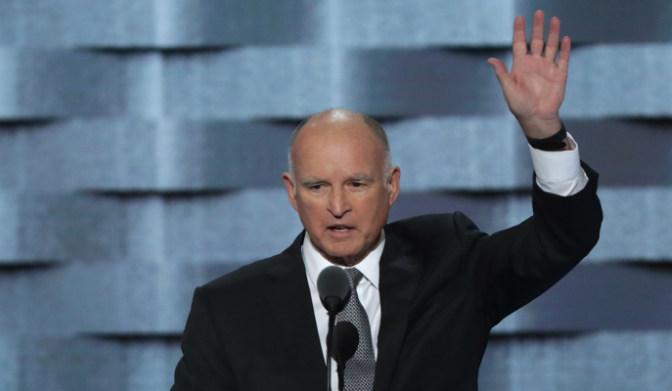Comments
CITYWATCH TODAY--As he leaves office Monday, after serving a combined 16 years as governor of California, Jerry Brown’s summation of what makes for great executive leadership boils down to one quality: experience.
In a final interview as governor with Calbuzz over the weekend, the 80-year old Brown reflected on what he’s learned about political and policy leadership — with ideas, insights and implications both for incoming Gov. Gavin Newsom and for Democrats seeking the White House in 2020 – that amounts to a veneration of elder wisdom akin to cultural practice in the Far East.
“I think experience, making mistakes, going through it all, I think that’s very helpful and kind of undercuts the idea that it’s time for a change or that we need a young person in there,” he said, when asked what he knows now that he didn’t know after his first two terms ended in 1983. “Well, you need a young spirit but you also need an old hand to get through the difficulties that you face.”
Young spirit; old hand. That is the aurea mediocritas of Brown’s accumulated wisdom from serving as chief executive of America’s largest state for longer than any in history.
“You need innovation and you need freshness, but I just think being able to size up the problems, the people – you can’t learn that in a couple of years. Certainly, as a young person not only did I not know as much,” Brown said, noting that he was not taken as seriously in his 20th century terms as he might have been by older legislators. “Now I’m the oldest and most experienced and that’s where authority can do the job more effectively. Those are just artifacts of time.”
Will Jerry play in 2020? Brown, whose job approval among Democrats is near 70%, has yet to decide how he plans to affect the 2020 Democratic presidential primaries, although he confirmed to Calbuzz that he will not be a candidate himself.
“I’m moving to the ranch,” he said of his homestead in Colusa County. “But I’m available for consultation at all times.”
When Calbuzz suggested that Brown could run as a favorite son candidate in California’s March primary, and thereby deliver the state’s humongous delegation at the Democratic National Convention in late summer, he didn’t offer much interest in the notion — although he did not dismiss it entirely either:
“You can keep flogging that one for a while, I guess,” he said.
What Prince Gavin needs to know. More broadly, Brown’s reflections on experience and the state of politics offered insight into his concerns for Newsom and for the Democrats seeking the presidency.
“The governor has got to be able to say ‘no.’ And you can’t say ‘no’ all the time. And I think we’re running out of ‘yesses’ that are easily paid for,” he said. “I’ve been able to balance the ‘nos’ and the ‘yesses’…I think it’s more polarized and I think compromises are out of the way. So, I’d say it’s going to be more daunting in one sense” for the new governor.
“But of course, if you dial back to 2011, that $27 billion deficit looked totally daunting,” said Brown, who – after raising taxes and containing new spending — is leaving California with a rainy day fund of about $14 billion as part of a projected surplus of nearly $30 billion, barring recession.
“Each governor faces his own issues and I would say the biggest issue is avoid big screw-ups,” Brown said. “And so far, we haven’t had any. I’ll keep my fingers crossed for two more days.”
Leaning in on Biden. Although he was not prepared to take sides in the 2020 Democratic presidential race, Brown’s observations about experience also suggested that he, like Sen. Dianne Feinstein and New York Gov. Andrew Cuomo have said in recent days, is leaning toward 76-year-old Biden, the former Vice President.
“You gotta know stuff,” Brown said. “I mean, how you gonna deal with the Russians positively as well as on issues where we’re in dispute? How you gonna deal with the Middle East, China and world trade – these are, I can tell you from my vantage point here as governor, this stuff is really complicated, more complicated than it was 30 years ago therefore you do need older people.”
The governor, who has studied in Japan and traveled in India and China, expressed an even more global view of the value in governance of time-tested knowledge and maturity: “The Chinese, you know, they run people through mayor, governor and up through the Politbureau. We just take anybody who can win a primary. But at some point the amateur hour is going to prove not up to the task when you deal with more experienced world leaders.”
Does that mean he will be supporting Biden?
“Well, I’m not going to give you my diagnosis of each of these candidates. But I can tell you right now I was a more effective governor in my 70s than I was in my 30s. So, whatever that says for the presidency, I think it means a lot. I know a lot. I’ve made thousands of appointments, I’ve had hundreds of serious arguments, I’ve seen things happen that I didn’t expect. So, I know how to read the tea leaves, the signs of the times and that does take experience.”
So, the No. 1 qualification for a great executive is experience?
“Experience, but also openness, sensitivity to people and to issues. To run for office you have to be ambitious and being ambitious means you’re thinking about yourself a lot.
“But if you’re totally wrapped up in yourself you miss cues, you miss understanding situations, so you need openness you need having been on the field of battle for years and years. I think even (John F.) Kennedy – he lucked out on the Cuban missile crisis –but when he was talking to (Nikita) Khruschev in Berlin, he screwed it up. Same thing with Bay of Pigs. And Bush got us into the war in Iraq…There’s not one magic bullet. You need wisdom, you need insight, you need experience and then you need to get elected, which takes a whole other bundle of skills.”
A satisfied self-assessment. As for his own governorship, Brown retires with a sense of satisfaction and joy.
“I don’t think there’s anything that I could have done that I didn’t do,” he said. “I got the gas tax, I got the income tax, I got the water bond – we’ve got a few things going, the high-speed rail and the (water) tunnels but those things take many, many years to come to fruition…
“I don’t know, reforming the prisons – I’d like to see that continue. A lot of these efforts, like the local control formula, the ground-water management, all that is generational – it’s not going to happen in a year or even in one term. These are long term efforts. Certainly, in the prison system, after I left (the governorship the first time) the 12 prisons in California were turned into 35 prisons, which is the biggest over-shoot ever in California history. And trying to roll that back is extraordinarily difficult. I did some, but I’d like to see more.”
Intriguing historical question: bottom line, does he think he was as good a chief executive as his late father, Pat Brown, considered one of the best governors in state history?
“I don’t really like those comparisons. I think I’ve been a good governor. Most people believe that. And I do attribute a lot of that success to the business cycle and the fact that I’ve had continuous growth every year that I’ve been governor. The total of three million new jobs, the $800 billion in new gross domestic product is incredible. So that’s a fortune platform, to say the least, on which to launch my governorship. Yes, I think my experience, practice makes perfect. The force was with me.
“And we’ll see how it works when you ride into that recession – Gray (Davis) ran into that, (Arnold) Schwarzenegger ran into that.
“And (George) Deukmejian, by the way, who made the colossal mistake of overbuilding the prison system, he enjoyed great popularity. And I always wondered why was he so popular, you know he wasn’t that dramatic or charismatic, but the economy grew virtually during his entire governorship and then just collapsed when (Pete) Wilson got there. He had that eight-year growth cycle and I’ve had the eight-year growth cycle. And both of us, if you look at the surveys, are the two most popular governors. Even (Ronald) Reagan was below 50% and a lot of it is the vagaries of the business cycle.”
So, does he think his old man would be proud?
“Oh yeah, I think he would.”
Well that’s got to be a good feeling.
“It is a good feeling. I get a good feeling just being governor and doing all the things that I do. I enjoy it. It stimulates the mind, it challenges one’s capacity to deal with other people and confront issues and problems. It’s a challenge that stimulates a response that you don’t get from anything that I know of.”
California in national politics.
For years, Californians complained that their presidential primaries in June came so late in the electoral cycle that by the time our massive vote was cast, it was too late to influence the outcome.
Flyspeck states like Iowa, New Hampshire and South Carolina always winnow the field before California with its huge party delegation – about 11% of the total needed to win the nomination and a fifth of the electoral votes to win the White House — even had a voice.
So last year, California moved its primary to March 3, still after the lead-off states, but early enough in the cycle to exercise some clout. With early absentee voting, Californians will start casting ballots about the same time as the Iowa caucuses.
The downside — for Democrats anyway — is that few of the contenders who are likely to run in a multi-candidate field will have the resources or name recognition to mount a serious bid for California’s cache of primary votes. With proportional representation at stake, it’ll be hard but expensive to resist.
California’s early primary, then, is likely to give an edge to potential candidates like Biden, Kamala Harris and Bernie Sanders who are already known to California voters. Their supporters don’t mind.
But for those who want California to be a genuine force in picking through the candidates, the very size and breadth of the state actually may mitigate against being able to check out the wide field, with possible bids from Eric Garcetti, Sherrod Brown, Julian Castro, Amy Klobuchar, Beto O’Rourke, Cory Booker and more.
How then, to assure that California can throw its weight around?
That’s why Calbuzz will keep flogging the strategy of electing Jerry Brown as a favorite son who can take the bulk of the state’s delegation to the Democratic National Convention and decide who gets the nomination. Yes, it’s a return to the old-school practice of wielding influence very late in the process, but in this wide-open electoral year that would be worthwhile.
His father, Pat Brown, ran as a favorite son three times – in 1952 where he took just 10% against Estes Kefauver – and in 1960 and ’64, when he delivered California to John F. Kennedy and Lyndon Johnson.
Based on his father’s experience and changes in how party nominees are chosen, Brown himself said “this favorite son business is chancy…it’s a nice idea, but we’ve got a lot of candidates today and the favorite son role has virtually disappeared.
“But I’ll be talking to all the candidates and see…sometimes, when they don’t feel they can win, they like the favorite sons to hold the delegations for them. But that was a former era and I think conditions have fundamentally changed.”
The Harris people would likely see this as a “Stop Kamala” movement. It needn’t be. But it would force any potential California candidate – like Harris or Garcetti – to prove her or his appeal beyond California, which any Democrat will win in November anyway.
“It’s an interesting idea and it would be a good way to showcase all that he has led on. But a favorite son candidacy would be pretty limiting to someone with his experience, leadership and forward thinking.,” said longtime Brown political adviser Joe Trippi.
“On the other hand,” added Trippi, “does anyone think Jerry is done trying to impact and drive the debate on the issues he cares about?”
Not hardly. Run, Jerry, run.
(Jerry Roberts is a California journalist who writes, blogs and hosts a TV talk show about politics, policy and media. Phil Trounstine is the former political editor of the San Jose Mercury News, former communications director for California Gov. Gray Davis and was the founder and director of the Survey and Policy Research Institute at San Jose State University. This piece appeared originally in CalBuzz.)
-cw















